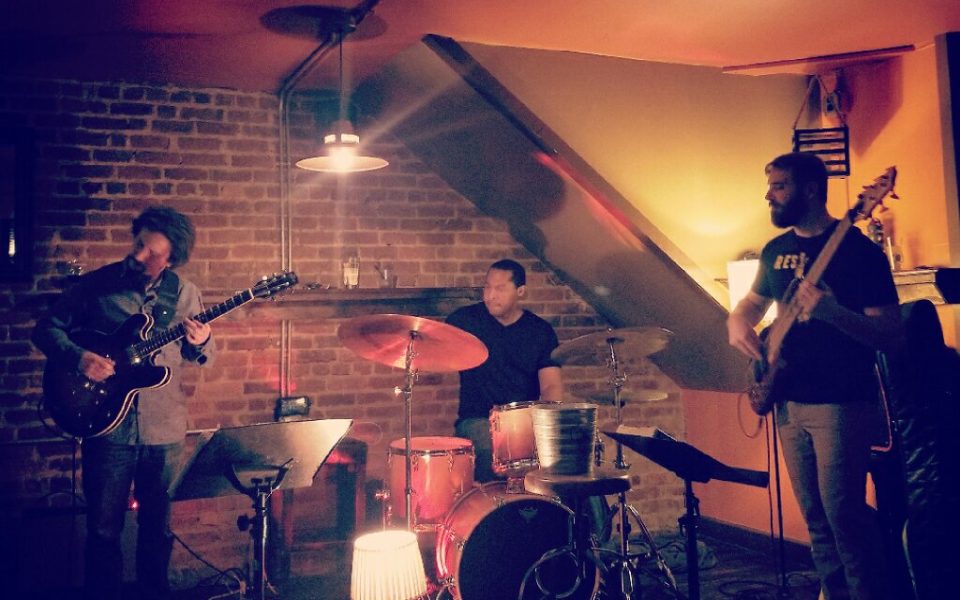On the surface, Recreation Billiards feels like a standard sports bar: a long, narrow bar on the ground floor with pool tables and booths, memorabilia of bygone spirits and beer and old newspaper clippings on the wall. But underground, down the tired wooden staircase sits the Whiskey Box, a dark, cozy room, almost speakeasyesque, where one can easily imagine thick plumes of smoke and dancing feet.
It begins as a whisper. The drums and bass and horns building slowly as the rhythms thrum up through the floorboards. Just under the babbling murmur of voices, TVs playing sports and the cracking carom of the pool table, the music finds its way to the surface. Sneaking through the feet-trodden floorboards, climbing up the stairs, it is there suddenly. Old, new, or otherwise, it’s jazz, and all you can do is tap your foot.
There’s jazz on Wednesday nights in the subterranean bar. It could be considered by some a risky move by management; the idea of bringing a seemingly archaic, niche style of music to a younger crowd runs the risk of keeping the bar empty. And yet, Jan. 10 saw the room filled.
The night featured a trio of local musicians, Daniel Seriff on guitar, John Ray on bass and Jonathan Greene on drums. The crowd spanned generations, all sidled along the standing bar against the weathered brick as the music began. Starting the night with a grooving sample of skilled improvised music, the trio followed Seriff’s lead. Syncopated, swinging drums laid the groundwork as the music sailed off around the room. Flowing forth like an undiked stream, the music spilled into all directions; it is a conversation between musicians and instruments.
Jazz remains one of the few genres that can move freely and unencumbered by time signature, tempo and key, while all at once, giving the freedom for utter self-expression by the musicians. Jazz is not a matter of playing what’s there, but playing what isn’t. And this idea seems to be coming to life in the Triad.
Though the announcement that Winston-Salem’s newest music venue Ramkat will open its doors this spring, many other clubs have been closing down or struggle to sell tickets, making performing outlets increasingly limited, especially for jazz music. Despite the ever-changing market, musicians are finding new, more unconventional locales for play. Like the Whiskey Box, other such bars that don’t traditionally host music are now seeing the value of it. With Tate’s Cocktail bar hosting open jazz on Tuesday nights, Foothills Brewing bringing in various acts on select weekends and Tate Street Coffee in Greensboro hosting their long running jazz nights, doors are continuously opening for musicians, keeping jazz alive in the Triad.
Serrif and his trio became something of a siren from the warm, honey-lighted corner of the bar, the music continuously drawing feet down from upstairs. Though electric guitar and bass are not the traditional makeup for a jazz trio, the music remained true to the genre. The union and familiarity between the musicians was palpable; Jonathan Greene’s eyes focused intently on Ray’s fingers and guitar, mimicking the subtle accents, while Ray and Seriff exchanged glances at times, or pinched their eyes closed to hone-in on the music. Before getting into the sheet music and scores of traditional songs, the trio moved into an improvised song. Ambient jazz chords led the melody as Ray’s fat, thumping basslines walked ghostly in the background. Greene’s use of polyrhythms and transition between Afro-Cuban grooves and swing patterns expanded the sound, creating layer after layer of deepening sound. The crowd seemed to forget about the drinks in their hands, as solos were exchanged between the performers.
The night moved into a breathing scene of jazz and whiskey filling the air, as if the moment were plucked out from a scene in “Madmen.” The thought that jazz is a lesser or dying genre, that it is for a generation that is no longer, is being shattered. Though the venues that book jazz tend to come and go, there is always someplace you can find it.
Join the First Amendment Society, a membership that goes directly to funding TCB‘s newsroom.
We believe that reporting can save the world.
The TCB First Amendment Society recognizes the vital role of a free, unfettered press with a bundling of local experiences designed to build community, and unique engagements with our newsroom that will help you understand, and shape, local journalism’s critical role in uplifting the people in our cities.
All revenue goes directly into the newsroom as reporters’ salaries and freelance commissions.


Leave a Reply